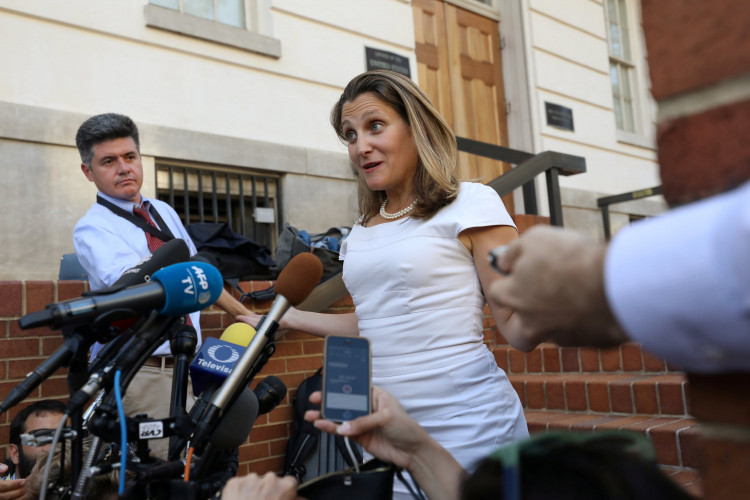A final North American Free Trade (NAFTA) deal that will satisfy all parties involved may not be achievable within the set deadline if Canadian officials were to be asked, an unnamed source revealed to The Globe and Mail, a news publication headquartered in Ontario.
The Globe and Mail stated that U.S. Trade Relations Representative Robert Lighthizer was insistent not to make any changes to achieve a compromise with Canadian Foreign Affairs Minister Chrystia Freeland. Indeed, late-night meetings on Thursday end up with both delegations agreeing to meet again on Aug. 31, the deadline set by U.S. President Donald Trump before he could finalize the agreements he initially closed during separate discussions with Mexico.
Various media reports were not clear on what exactly Freeland and her team were negotiating with Lighthizer and his camp. The Business Times previously reported that dairy farmers from Canada are under a system that places high tariffs to limit produce that is being imported to the United States. Trump wanted to scrap those tariffs or at least exclude the pricing system for milk that impacts Washington's exports of milk ingredients - still, there is no confirmation yet that this was what hinders the parties from achieving concessions.
The United States and Mexico have agreed to revise some sections of NAFTA on Aug. 29. One revision now allows the 10-year data exclusivity between the United States and Mexico for biologic drug makers to be protected by copyright laws for 50 years - something that Canada reportedly disagrees with. The country would reportedly like to negotiate for a lower threshold for the intellectual property rights.
Whatever issue that remained under discussion, the Trump administration is insistent to resolve it and sign an agreement by Friday. Trump told Bloomberg News that Canada will have to sign a deal at some point, adding that this should take place on Friday. Even if it takes longer before Canada can sign a deal, the country has no choice, the president said.
Unnamed sources with direct knowledge on the matter have varying opinions. Three people revealed to Bloomberg that a deal will be announced on Friday. Three other people said there is literally no possible outcome.
Andres Rozental, a former deputy foreign minister of Mexico, is putting the blame on his country on why Canada was seemingly thrown in a difficult position at present and was left alone to face mounting pressures for its decision. He explained to CBC that Mexico, in the first place, should have stood strongly alongside Canada and did not agree to a separate discussion with the United States.
Rozental recently wrote an article for The Globe and Mail where he bluntly accused Mexico of sidelining Canada. He condemned his country's decision to go out on its own while its relations with Canada was what in the first place contributed largely to why Mexico can successfully negotiate some proposals involving NAFTA.
The former deputy foreign minister believed Mexico's move was motivated politically. He is of the opinion that it was his country which wanted to expedite the process so Mexican President Enrique Peňa Nieto will be the one to sign the deal, under his administration before he steps down in November.
Nevertheless, Rozental opined that all three countries are making the mistake of deciding in haste. He explained that trade deals are complicated and hence warrant lengthy and comprehensive negotiations among all parties involved.






